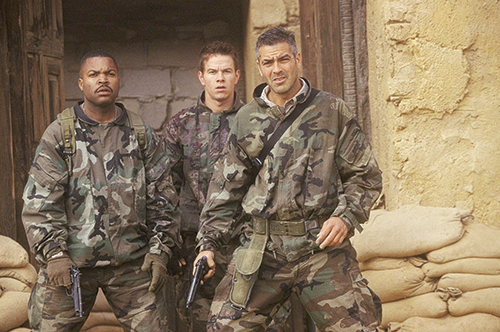
There’s a marked difference between films about the Gulf War and films about the Iraq War that is obvious and fascinating at the same time.
The Gulf War was the first war in which the media were directly involved, and there’s a perception that the military presence was almost a performance.
Kuwait was liberated in a neat and tidy fashion through a serious of remote air strikes, and many Gulf War veterans returned home having never seen combat and with none of the glamorous stories their fathers and grandfathers had of war.
The aimless and confused sense of identity of the soldiers in that war was a major theme in Sam Mendes’ 2005 film, Jarhead, but it is also a focus of David O. Russell’s earlier and arguably superior film, 1999’s Three Kings.
Three Kings, which is playing at 5th Avenue Cinema this weekend, stars George Clooney, Mark Wahlberg and Ice Cube as three soldiers stationed near Karbala directly after the Gulf War who plan to steal a shipment of Kuwaiti gold.
Russell admitted to lifting the idea from a purchased script by former comedian John Ridley, who received a “story by” credit but was reportedly unhappy with the experience. It was just the first instance of controversy for the film, which helped give Russell, who went on to direct fine Oscar bait like The Fighter and Silver Linings Playbook, an industry reputation as a tyrannical taskmaster.
To be fair, Warner Bros. put an enormous amount of pressure and strict limitations on the director. The story of this film’s conception is a unique look at just how badly the big studios don’t want to make cerebral auteur films, especially when the political ideas behind them are controversial.
But Russell’s slashed budget and truncated shooting schedule may have in part led to the innovative style the film is famous for: The steadicam shots and one-camera explosions help give Three Kings a documentary feel.
Most people are more familiar with Russell’s conflicts with Clooney on the set. The director badly wanted Clint Eastwood and then Nicolas Cage for the role, but Clooney, who was then untested as a leading man, fought hard to win it.
Clooney considered Russell to be in over his head, and he would often defend extras and crew members from the director’s supposed fits of rage. The experience led Clooney to say that although Russell is a brilliant filmmaker, he’d never work with him again.
The story behind the film can distract from the fact that Three Kings is first and foremost an excellent work.
Returning to the difference between the Gulf War and the Iraq War in films, the former certainly lends itself to satire a lot more easily. Russell’s script is biting, intelligent and hilarious.
The way Clooney’s Archie Gates, Wahlberg’s Troy Barlow and Cube’s Chief Eglin manage to represent American imperialism, capitalism and greed to the Iraqis they encounter is something everyone can laugh at, but only because the lines ring so true.
Nora Dunn, who co-stars as a hard-hitting reporter, bursts into tears in front of oil-soaked pelicans and asks about the war, “What did it all mean?” Out of context, this could easily be a serious scene, but in Three Kings it’s not at all.
Instead the scene mocks the rampant superficiality and obliviousness of the Americans who have come to loot and pillage for literal and metaphorical gold and put on a noble show for the cameras at the same time.
The same is true of the scene in which Said Taghmaoui’s Iraqi interrogator asks Barlow why America made Michael Jackson cut off his face. Barlow insists he did it to himself, and the interrogator tells him that America made Jackson hate himself: “Michael Jackson is pop prince of a sick country.”
Three Kings
Friday, May 10, and Saturday, May 11, at 7 p.m. and 9:30 p.m.
Sunday, May 12, at 3 p.m.
$3 general admission, free for students
In that scene, Russell is not afraid to go deep and illustrate the true lack of understanding and sympathy of Americans for Iraqi civilians, but its jumping-off point is a place of ludicrousness. This film is often funny because the reality of our media-saturated, warped culture can be laughable.
Maybe in a few years we will once again see a change in how Iraq is depicted in films.
There’s nothing truly satirical about a film like The Hurt Locker, though luckily we’ve come to the point where it’s OK to be critical, even extremely critical, of the governmental forces behind these wars—especially because there’s nothing funny about so many people dying.
And yet it’s rare for a film as witty, stylized and entertaining as Three Kings to have so much to say, and that might be an even better way to get people to listen.

